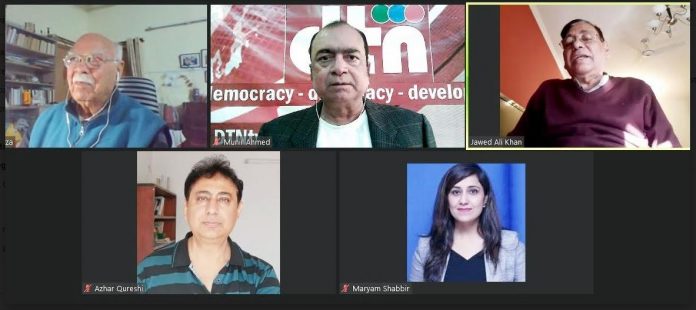DNA
ISLAMABAD – The experts speaking at a webinar on Sunday urged the government institutions to work according to their mandate and scope of work without any discrimination to conserve the natural ecosystems and habitats of the Margalla Hills National Park (MHNP). Stringent implementation of laws, capacity building of communities to understand the importance of the habitat they are living in, and participation of citizens and other stakeholders are very important in planning and implementation of the plans for the National Park.
They asked the relevant institutions to make necessary amendments in the legislative framework guiding the conservation and protection of the Margalla Hills National Park. The land-use change, eye-soaring construction, heavy street lights, massive traffic and no system of sewage and solid waste management are the main challenges which are being ignored by the hand-cuffed government institutions.
The webinar was organized by the Development Communications Network (Devcom-Pakistan) to brainstorm on the solutions for integrated conservation and protection of Margalla Hills National Park (MHNP). Well-known biodiversity expert and conservationist ZB Mirza was the keynote speaker while the panel of experts included UN Habitat Country Manager Jawed Ali Khan, Devcom-Pakistan Executive Director Munir Ahmed, Institute of Urbanization Executive Director Mome Saleem, Eco-Conservation Initiatives (ECI) Executive Director Azhar Qureshi, Sustainable Development Policy Institute (SDPI) Project Coordinator Maryam Shabbir, President Islamabad Crescent Lions Club Bashir Ahmed and Regional Coordinator Association of Lions Clubs International Sibtain Raza Lodhi.
Biodiversity expert ZB Mirza said vested and material interest has destroyed the Margalla Hills National Park while the custodians of the park remained indifferent to the havoc played with the biological diversity of the Park. The Rawal Lake and the Shakarparian, the other two major parts of the park, have been impacted the most. Despite court orders, the city managers and the federal government could not stop the poisonous waste going to the Rawal Lake while the state institutions destroyed the green cover of the Shakarparian.
ZB Mirza said tree-plantation is not the solution to biodiversity conservation but a hazard in many cases. Biodiversity depends on the ecosystems which are being destroyed callously. We need to check our population and consumption of natural resources to reduce stress on the natural system. Many researches have been done but dusting in the shelves of the universities. No one is interested in using them. We have studies on the Margalla Hills National Park as well but they are neglected while planning any fiddling in the National Park. We have to bear the brunt of the unwise decisions.
UN Habitat Country Manager Jawed Ali Khan said we need to adhere to laws stringently and check the land-use change. Stakeholders and communities are not included in the planning stage for any initiative being taken in the National Park. Unfortunately, the Pakistan Environment Protection Council is dormant for years though it has a very important role in the federal policies and projects. Citizens are seen nowhere in the planning and monitoring of the projects. Same is the case of the Margalla Hills National Park. We need to understand and realize that the National park is an asset for us, and we need to protect its biological and natural heritage. The loss of habitats would impact the life of human beings living within the habitats and ecosystems, and downward. The federal capital is already suffering from the water shortage while the diminishing reservoirs are getting polluted day by day. We need to act urgently.
Devcom-Pakistan Executive Director Munir Ahmed said Islamabad Wildlife Management Board (IWMB) has developed a PC-I amounting to PKR 1.8 billion and submitted it to the Climate Change ministry for its approval. It could be a significant way forward for the conservation of wildlife and green nature of the Park. We need to have a combo of joint efforts by the citizens, communities, city managers, federal government and the conservation authorities and experts. It would have been much better if the citizens, experts and communities were taken on board to finalize the IWMB PC-I before its submission to the ministry of climate Change.
Mome Saleem urged for partnerships of stakeholders including communities to manage the park. We jointly can strengthen the government institutions against the mafias. But, the government shall also act in harmony of law to check the malpractices in the National Park. Closing eyes won’t work.

















